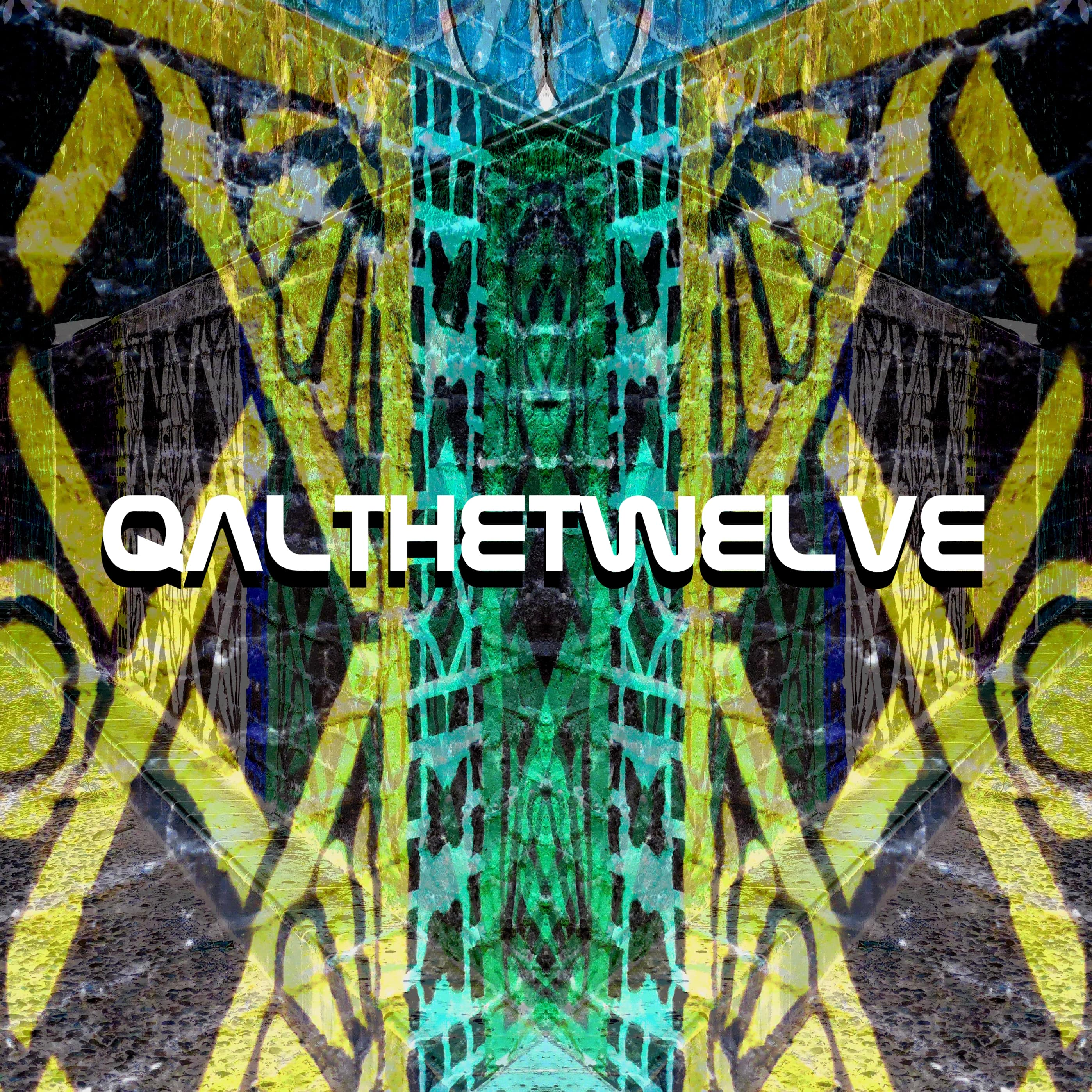Books


Libri sunt Libertas
In the beginning, man gained the spoken word. Since time immemorial, he has enriched himself through his spoken stories and calmed his kin on those cold, Pleistocene nights. Yet, these stories, his calming words, all that he was, could not be conveyed beyond what memory held, for the spoken word exists only in the fleeting present. That was until man gained one of his greatest allies. Though his best friend was the canine that watched his camp and tended to his flock, it was through his ally that he recorded history, built great pyramids, mapped the winds and the seas, and set his feet upon another world. Man had gained the written word and he has always been the better for it.
It is in this spirit that I have dedicated this section to recounting some of the books and articles that I have read, plan to read, and what I gained from them as a person. Books are the lifeblood of great civilizations, for they represent all that mankind can do when he dedicates his time and energy appropriately. They hold stories of ancient Sumerian Kings and Celtic Warriors, treatises on medicine and the physical properties of the universe, or sometimes just simple whimisical tales and fables to lighten the mundane. I have harbored a fascination and love for the written word since my youth and so below you'll find those emotions manifest. - Qal

The Solar System
This is a children's book published in the year 2008, only available for purchase through the Scholastic Book Fair. I include this book here, and in the first position on this page, because it was likely the first book in which I was fully engrossed. As evidenced by the state of the spine in the photograph, from the tender age of five I tool this book with me everywhere I went, from school to the doctor's office, reading everything cover to cover, over and over again. I am almost certain that much of the basic information about celestial objects in the Solar system that I take for granted, was probably instilled in me through my obsession with this book for multiple years. Lastly, I would like to say that upon looking through the pages, I reflect on my growth into maturity and how temporally long that has been. Specifically, I am referring to the hopeful tone with which the book describes the New Horizons Space Probe and its mission to photograph Pluto... in the future tense. It is quite an unsettling thing to realize how much time has passed from one's childhood, but I am nevertheless glad that said childhood at least involved books like this one.
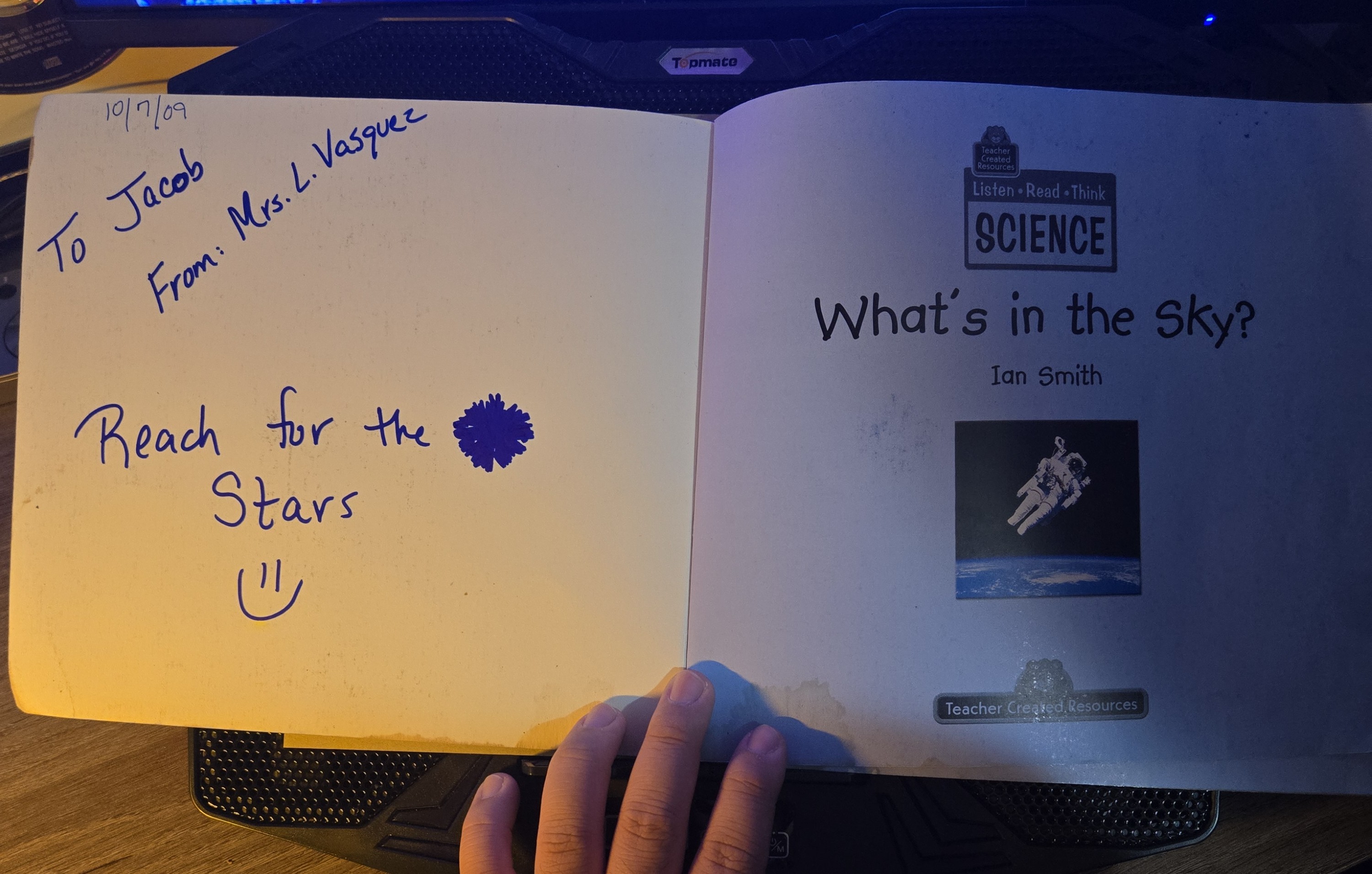
What's in the Sky?
This a children's book intended for educators to have in their classrooms to inform young children about the world in which we live. I do not know the exact date of publication but I can be certain that it was before October of 2009. As can be seen, there is a date on the inside cover of the book with a message written to me by my Kindergarten teacher, Mrs. Vasquez. Since a young age I had been passionate about learning, and at that age the stars and all things that involved the heavens is what captured my attention. My teacher, taking an interest in my passion for learning gave me this book and wrote "Reach for the Stars". She would pass away five years later in 2014 from breast cancer, aged 44. She was a dedicated educator and tried to foster in me what many others during my schooling never bothered to. I still hold immense respect for her and I hope that wherever she is, she would be proud of all that I have accomplished, and all that I will come to do. I may not become an astronaut like I constantly professed as a child, but there are more stars in this world than those in the night sky, and rest assured I will reach for them with all human ability.
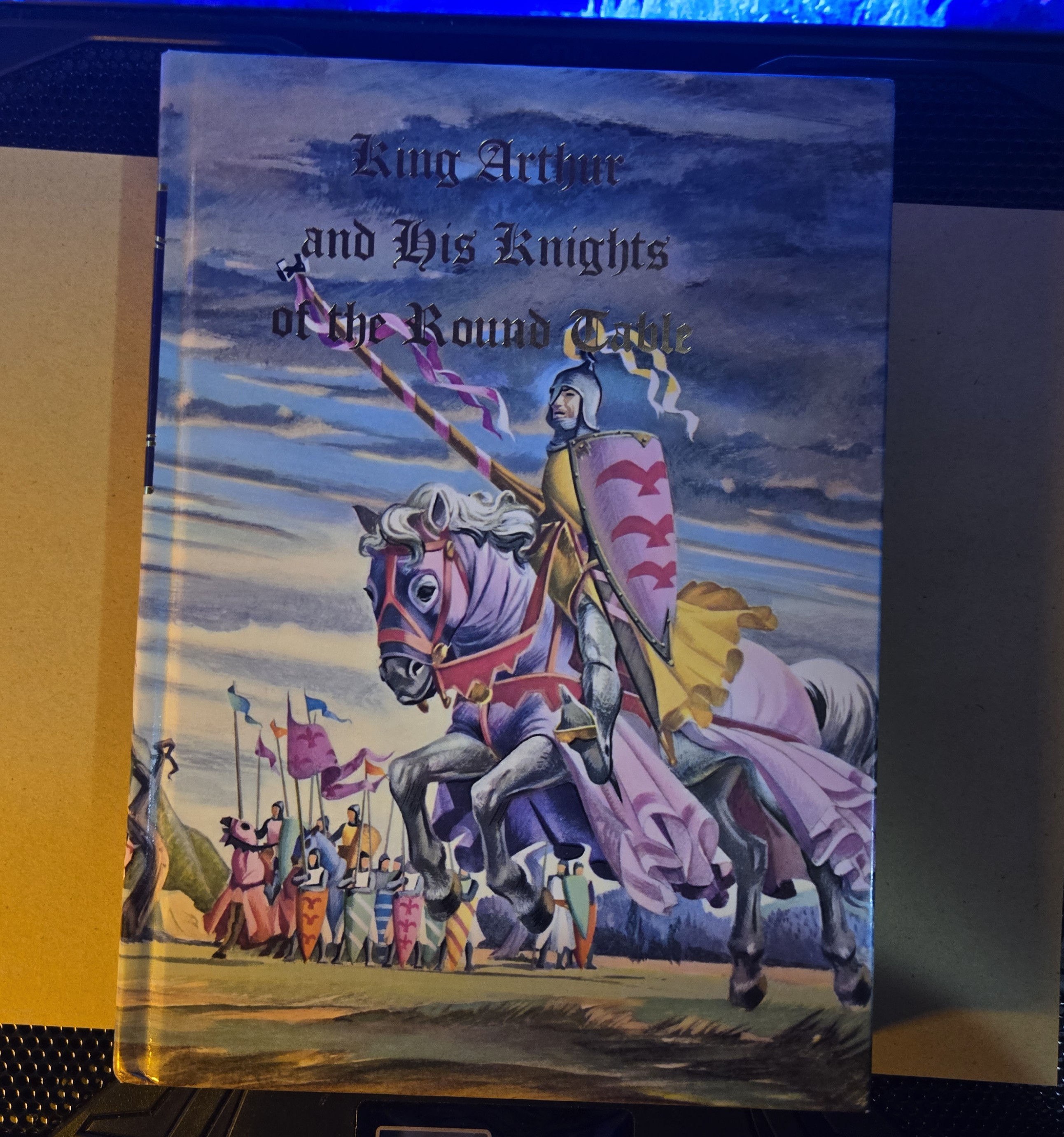
King Arthur and His Knights of the Round Table
As any young child should, I became intrigued by the fantastical. While others at the time of my childhood would fulfill this need through books of vampires or wizarding schools, I found Arthurian Lore. While perusing my school's library in need of a book to read and after having already reread the Chronicles of Narnia for the third time, I found a short book that detailed the heroics of a knight named Sir Gawain and a great siege between the forces of a King named Arthur and knight who had betrayed him named Sir Lancelot. I read this book with all the vigor a child could muster towards such a thing, and upon returning to the spot where I had selected that book of Sir Gawain, I found a larger book that professed all the tales of King Arthur, abridged for younger readers of course. Being a library book, I do not have the original copy that I would have read from but I did search the internet and purchase a copy of the exact printing which is pictured here. This was a very formative book for me, informing my ideas about knights and honor, inspiring my writing, and even familiarizing me with how to read Early Modern English, which was incredibly helpful when Shakespeare was required.

Beowulf
The copy pictured here is not the one I would have read as a child, but nevertheless I felt it was necessary to include as the tales of Beowulf were just another addition to my childhood arsenal of heroic, mythical characters who did amazing feats and which informed my understanding of the world. Truth be told, I far preferred King Arthur as a boy, but Beowulf was still a significant personage. Reading tales of this Viking-adjacent warrior who would go to battle hideous monsters and a dragon was not only entertaining, but it arguably cultured me as well. I am of the opinion that knowing many of the mythical tales from around the world is valuable, for it grants us the ability to recognize allusion and motifs lifted from established works of literature. It also links us to the past and forces us to recall that our modern Batman or Captain America, and the ways we use them to entertain and convey stories, are not so removed from those methods of the past.
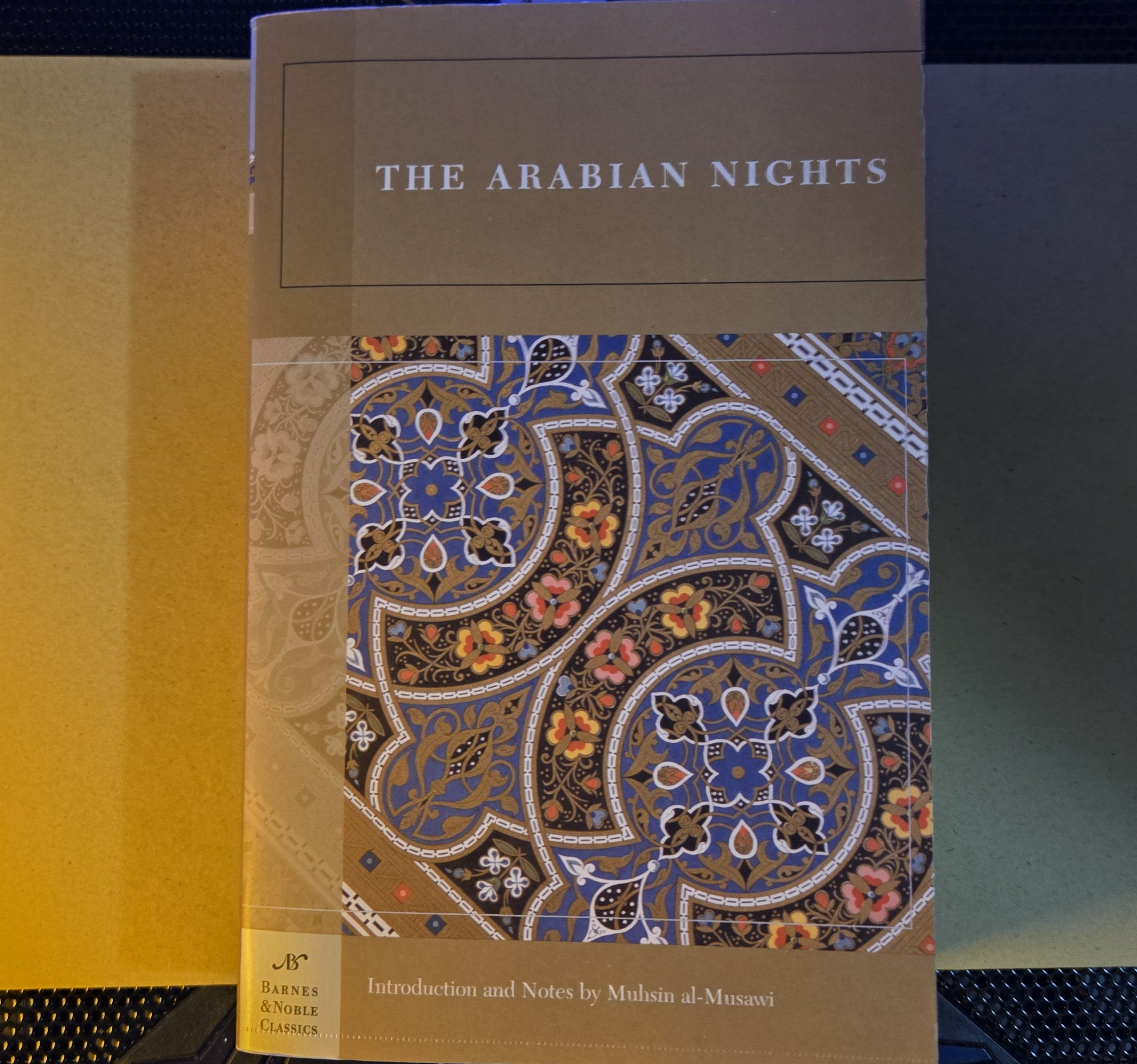
One Thousand and One Nights (The Arabian Nights)
I have absolutely no recollection of what the copy I would have originally read the Arabian Nights from looked like, but I am certain it was not the one pictured. However, I read these stories in elementary school and I still hold the vivid mental imagery of Sinbad the Sailor riding atop the back of a Roc as described in the book. I remember getting into the car being picked up from school that day, imagery of the fantastical tales that Scheherazade told the Sultan still ringing about my head. As an adult, I have reread portions of this book, specifically those concerning Sinbad the Sailor and his seven voyages, which are an incredibly great story. It is as though somebody set the Odyssey in the 9th century Abbasid World (That's actually exactly what they did, there's literally an Ogre that's obviously Polyphemus, it's great). All in all, this was an incredible series of stories to me as a young child and it is still valuable as an adult. Indeed, I would argue it is one of the best examples of books that earn the title of World Literature.
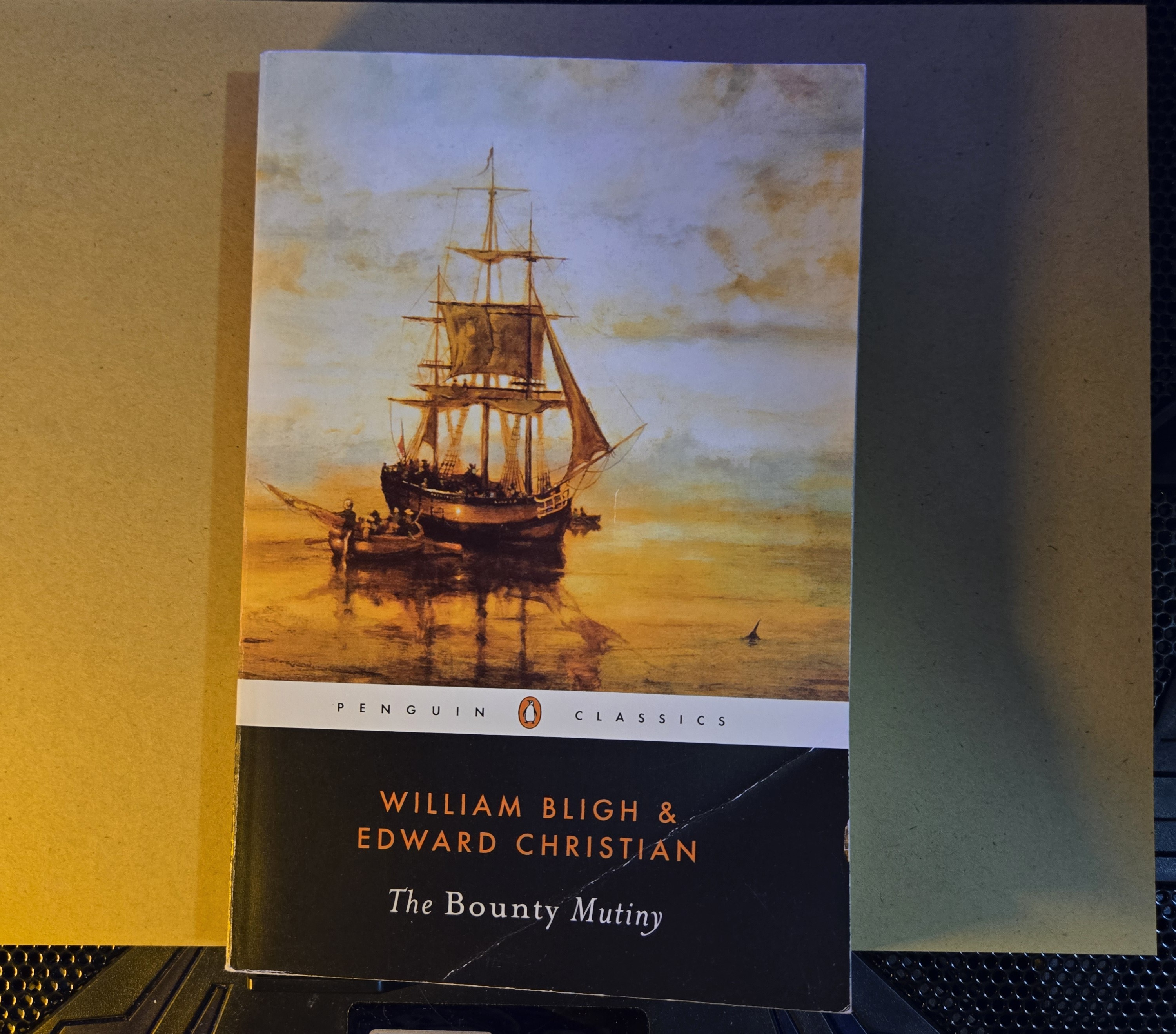
Mutiny Aboard HMS Bounty
One day, in junior high, for whatever reason the teachers started giving out these books to every student in the school. There we many different titles, most about an inch and a half thick, were illustrated, and they had either a red, green, or purple cover. I do not know exactly which title I received but I recall trading it for one that another student had been given, that being a copy of The Mutiny Aboard HMS Bounty. This book would remain in my backpack for practically the whole of the school year and when I had finished my work and needed to wait until the next class period, I read it. When I was waiting before or after band practice, I read it. When I was waiting in the car after school to pick up my little siblings from elementary school, I read this book. The one pictured here is not the one I read, as the one that I had was an abridged copy for junior high readers. Yet, I bought this copy and read it during my first week of university before classes begun, as I had resolved to read the true version. It was nostalgic to say the least, and likewise it satisifed by fascination with the sea and maritime activity, and though I'm sure Captain Blight would not have preferred to think of it as such, it also served as another traveling-adventure tale, much like a genuine historical Odysseus or Sinbad. Finally, I will note here because I often see the opposite attitude towards this tale, Captain William Bligh was the victim of a mutiny by traitorous people who wanted to continue to exploit the Native inhabitants of the Island of Tahiti. Captain Bligh was in the South Pacific to do a job, gather breadfruit and bring it back, and so of course he had to leave Tahiti eventually. He was not unsually strict or harmful towards his crew, this crew simply wanted to live an idealized and romanticized life on an island "paradise" in the remotest part of the world. They quickly found that it was not paradise and resorted to kidnapping, sexual assault, and theft in order to eek out a meager existence on remote Pitcairn Island in the end. Captain Bligh was the good guy!
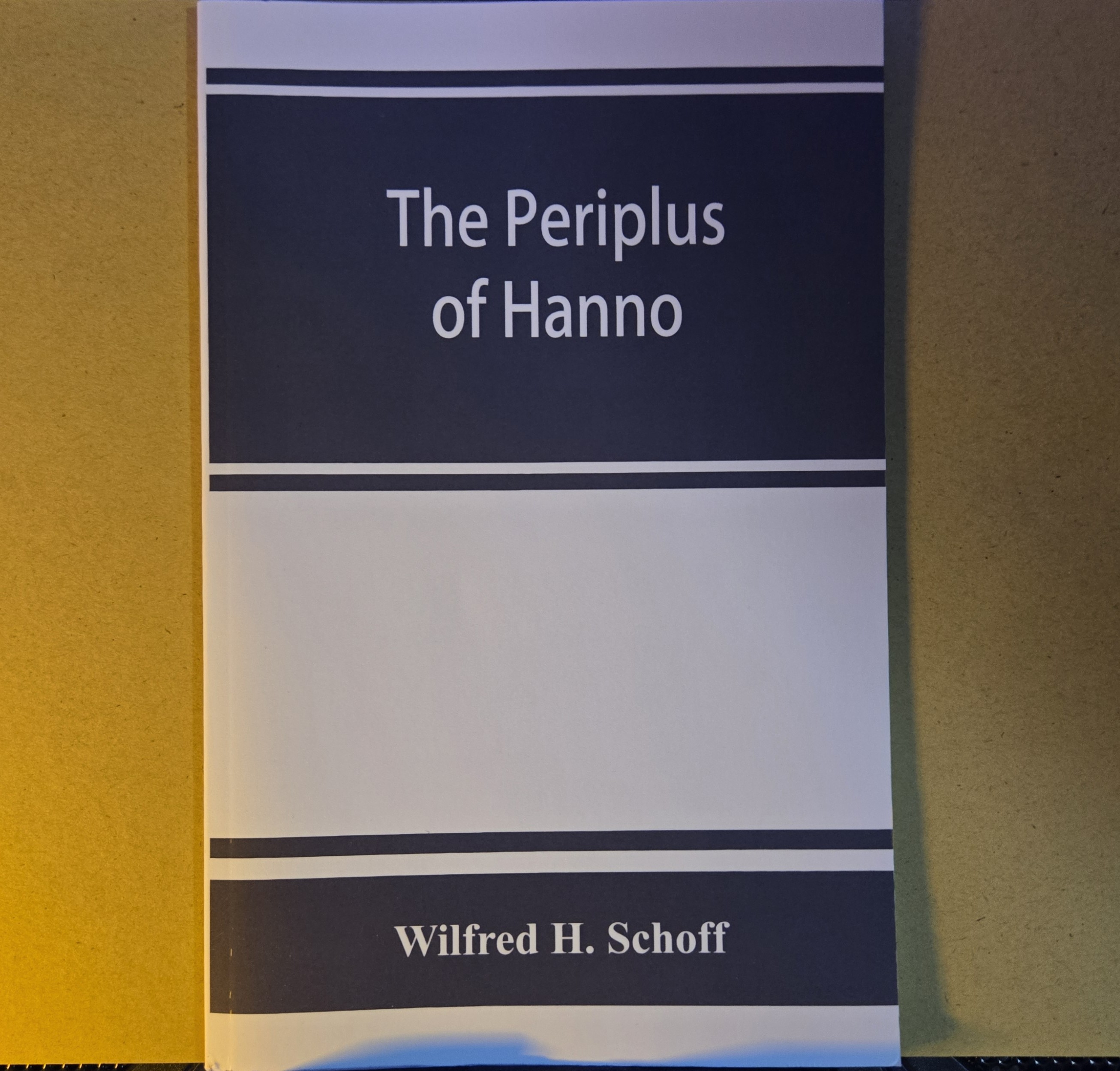
Periplus of Hanno
There are things in this world that will never, can never be known because they have been forgotten across the vast stretches of time than mankind has occupied. Entire stories, cities that lasted a thousand years, so many have risen and fallen and then all record of their existence has been shrouded by the unending march of time. Sometimes though, a piece, just a stray sentence, ceramic figurine, maybe even a poem, something gets left behind that hints at a much larger story that has otherwise been lost. The Periplus of Hanno is that piece that hints at what must have been a wonderful and harrowing tale of exploration long before the Age of Sail. A periplus was a kind of log of ports and places visited by an ancient sailing vessel, and this one was originally written in Punic. It was attributed to a man named Hanno the Navigator and was salvaged from the city of Carthage by a Greek individual who brought it back to the Aegean World from whence it comes down to us today. Hanno the Navigator, based on the text of periplus, may have set out from Carthage and sailed along the coast of West Africa perhaps as far as modern-day Cameroon. Trading with Native inhabitants of the region and what might even be a description of a Gorilla are all recounted in this relatively short text. To me, the Periplus of Hanno represents all that we don't know that we don't know about mankind's past and the great wealth of stories that the unknown surely holds. It drives me to always look for horizons, not only in the future, but also in the past.
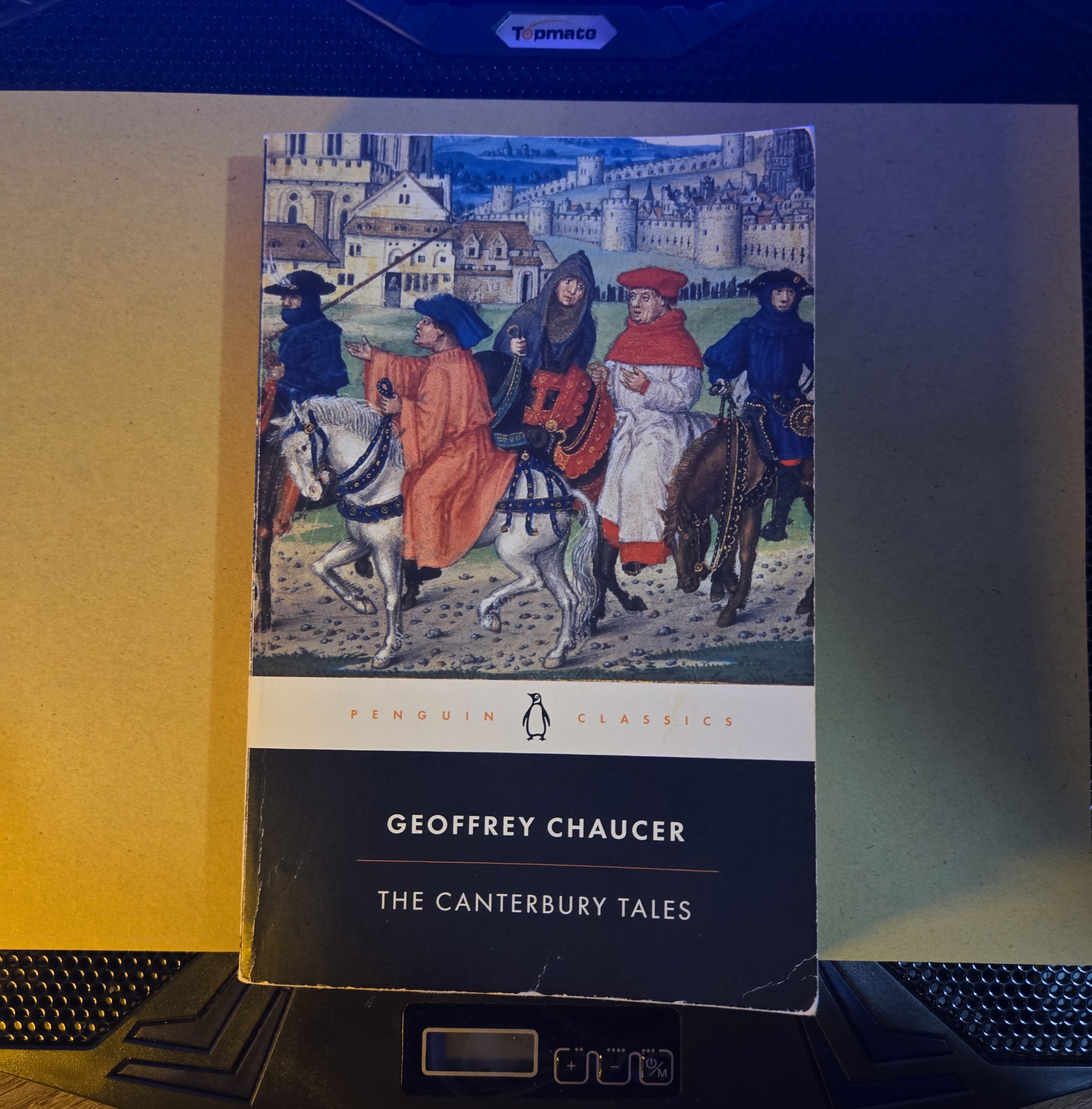
The Canterbury Tales
The Canterbury Tales might genuinely be one of my favorite books of all time. It is definitely my favorite work of literature in poetic verse. I purchased this copy during my first ever trip away from home on my own for a literary criticism competition in San Antonio, Texas. When I finally got around to reading it, I was amazed. Chaucer set up the book in a frame story, where many people who are about to set out on a pilgrimage to Canterbury to visit the Cathedral there are challenged by the host to tell the best stories they can, after which the best would receive a reward. It seemed so humanizing, that the story was not set from the very beginning in a time of mythic heroes or a fantastical world. It was set in the real world, the world of some six centuries ago, but nevertheless the same world I occupy. So many of the tales similarly made reference to personages and activities of daily life then, that are familiar now. Priests and Nuns and bookish university students all feature. Chaucer is even humorously self-deprecating in a way that is far more relatable than say the tone with which Dante Alighieri describes himself. Each tale describes a different world, a different a moral, has a different point, and reflects the personality and occupation of the character telling it. It almost gives the impression that you are riding along with that caravan, trotting along that 14th century English road listening to your fellow pilgrims as they recount stories of ancient Greek knights and farting friars. Again, one of my favorite books.
More Coming Soon!
